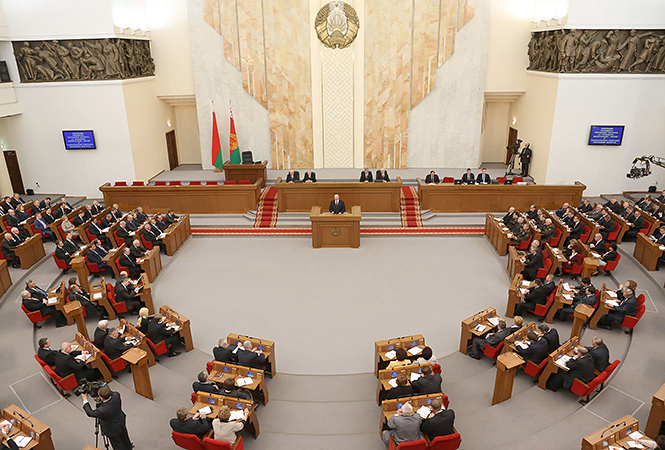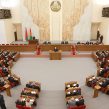
Asserting the Necessity to Defend Belarus’s Independence
Publication: Eurasia Daily Monitor Volume: 11 Issue: 80
By:

Belarus ignored the April 24–26 Prague summit of the European Union’s Eastern Partnership (EaP). Although the statement by the Ministry of Foreign Affairs attributes this decision to the alleged failure of the Czech organizers to abide by the basic principles of equality and non-discrimination (https://news.tut.by/politics/396459.html), hardly anything differed this year from the previous summits that Minsk had sent representatives to in the past. Since the very first of them, in 2009, the organizers have been unwilling to host President Alyaksandr Lukashenka, but they subsequently disposed of the official invitations to the heads of states, instead leaving it for the states themselves to decide who will represent them. Belarus sent its representatives to each previous meeting. Most probably, non-participation this time around has to do with the Ukrainian crisis and the perceived necessity to send certain messages to both Russia and the West.
These messages are part of the balancing act between Russia and the West (see EDM, April 3), and Yury Drakakhrust, of the Belarusian Service of Radio Liberty, used the image of a metronome to describe them. Thus, at one point, Moscow is reminded that Belarus is its closest ally and Minsk declares it will not participate in the EaP summit with Moscow’s geopolitical nemeses during a standoff over Ukraine. Yet, just one week later, the metronome will swing the other way as Belarus decides it will be represented at the meeting of the ministers of foreign affairs of the EaP countries in Budapest. Again, one day, Belarus casts a pro-Russia vote at the United Nations; another day, President Lukashenka meets with Ukrainian acting president Olexander Turchynov. Lukashenka will speak strongly against the federalization of Ukraine; but at the same time he will suggest that he coordinates his every move—regarding Ukraine—with Moscow (https://www.svaboda.org/content/article/25361073.html).
The Ukrainian crisis left its mark on Lukashenka’s entire April 22 State of the Nation address. The necessity to defend Belarus’s independence was one refrain of his two-hour-long speech. Belarus’s president stated that there is no other country in the entire world with such a loyal attitude to the Russian language. “If we lose Russian, we will lose our mind,” was the beginning of Lukashenka’s pithy pronouncement. The latter part of that pronouncement, however, has had no analogues in his previous speeches: “But if we forget how to speak Belarusian, we will stop being a nation.” In the past, Lukashenka was accused of disparaging the Belarusian language. Apparently this change of heart has to do with a keen perception of a potential threat to Belarus’s statehood. Yet, once again, however indirectly, Lukashenka militated against ethnic nationalism that, in his view, is unfit for Belarus. Moreover, he spoke in favor of civic nationalism, which he wants to not only cultivate but also prop up by his security apparatus and at the same time preempt any pretext for Russia’s aggression. “As for the suppression of Russians [in Belarus], the idea that some insinuate, I do not even want to discuss this topic […] because it is impossible in today’s Belarus to extract [purely] Belarusian blood […] from a Belarusian person even though many talk and dream about that. Everything is mixed there. And therefore, any talk about Russianness, Belarusianness, pro-Russianness and pro-Ukraineness is a step toward unrest. But apparently somebody wants unrest. That is why we have always fought the false ideas emanating from the West, NATO [sic], and from elsewhere. I instruct the law enforcement agencies to nip such talk in the bud regardless of who initiates it,” said Lukashenka (https://www.sb.by/post/163010/).
In his address, the Belarusian leader once again spoke against the federalization of Ukraine. “Probably our Russian brothers do not like the stance I took against federalization. But I would be a dishonest man if I bypassed this topic. I would be a scoundrel if I did not say what I think and if I supported the point of view of some Russians who speak in favor of federalization. Why would one escalate the situation and create an unmanageable or managed chaos in Ukraine? I am categorically against it, whether one likes it or not” (https://www.belaruspartisan.org/politic/264835/).? Lukashenka assured Belarusians that they would not be ashamed of his position on Ukraine and even resorted to such folksy metaphors as “I have never been toilet paper, regardless of whom I deal with” (https://naviny.by/rubrics/politic/2014/04/22/ic_articles_112_185291/).
Such expressions were excluded from the text of Lukashenka’s speech published by Belarus’s main government newspaper. Likewise excluded was his favorable opinion of Ukrainian acting president Turchynov: “He is a decent, honest and religious man. He is the author of dozens of books and he defended a doctoral dissertation. Yes, he is excessively nationalistic. But he is a normal person, not evil incarnate” (https://www.unian.net/politics/910372-belarus-zainteresovana-v-stabilnoy-protsvetayuschey-edinoy-ukraine-lukashenko.html). Also Lukashenka’s Freudian slip about Vladimir Putin showed up only in the Russian and the opposition-minded Belarusian reports of his speech. “Some people are trying to scare us: ‘Tomorrow,’ they say, ‘Putin will come to Belarus and seize it.’ I repeat: No matter where [an invader] comes from, we will fight for our country. And I sometimes add that if Putin comes here, there is no certainty which side Russians will be fighting on” (https://www.regnum.ru/news/polit/1794155.html#ixzz3074UgsY6).
Yet one more refrain of his address was his strong dislike of revolutionary change; only an evolutionary and gradualist approach to sociopolitical change is welcome. On this topic, Lukashenka is actually on the same page with most Belarusians, as the March 2014 national survey by Belarus’s most influential pollster has shown (see EDM, April 24). Some other refrains included fighting corruption; a promise to raise teachers’ and medical doctors’ salaries; a plan to deposit $10,000 to the bank account owned by any mother who gives birth to her third and subsequent children (an incentive to raise fertility along the lines of what has been practiced in Russia); and a commitment to sustain economic growth.
It is likely that Lukashenka’s address to the nation has effectively opened his electoral campaign. The next presidential elections in Belarus will occur in 2015.




